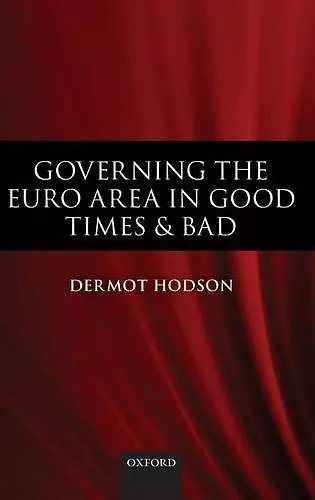Governing the Euro Area in Good Times and Bad
Format:Hardback
Publisher:Oxford University Press
Published:25th Aug '11
Currently unavailable, and unfortunately no date known when it will be back

Can the euro area survive without a more centralized economic policy? What lessons can be drawn from Economic and Monetary Union about new modes of policy-making in the European Union? Have euro area members spoken with one voice on the international stage and what does this mean for the European Union's ambitions to be a global actor in its own right? This book explores these three key questions through an in-depth analysis of euro area governance from the launch of the single currency in 1999 to the sovereign debt crisis of 2010. Drawing insights from the study of European Union politics, comparative political economy and international political economy, it examines: Economic and Monetary Union's break from the Community method of policy-making; the European Central Bank's ambivalence about the pursuit of ever closer union; the Eurogroup's rise and fall as a forum for economic policy coordination; the interplay between national fiscal institutions and the stability and growth pact; the broad economic policy guidelines' failure to apply peer pressure; the European Union's influence within the G20 and the International Monetary Fund at the height of the global financial crisis; euro diplomacy towards China and other rising powers; and current debates about the fate of EMU and the reform of euro area governance in the aftermath of the global financial crisis. The book's conclusions challenge claims that the euro area is in crisis because of its decentralized approach to decision-making alone and the corollary that the euro can be saved only through a further transfer of sovereignty to the supranational level.
The book presents one of the most profound reviews of contemporary euro area governance currently available. It presents a fresh look on coremechanisms and institutional structures, which are under review or have already been reformed. * Uwe Puetter, Central European University, Hungary, Parliamentary Affairs *
Hodsons book on governance in the euro area provides a helpful and important step forwards in understanding how EMU fits into these discourses and how its design flaws may hinder certain aspects of its sustainability. * Alison Johnston, Transfer *
This fine-grained analysis of economic governance in the EU provides nuanced insights into the challenges facing the eurozone and its members. The study also sheds light on wider issues about the alternatives to the traditional Community method of decision-making. * Professor Helen Wallace, European Institute, London School of Economics and Political Science *
Dermot Hodson has provided a sophisticated and timely study of the governance of the Euro Area as a distinctive exercise in European integration. At a time when this new experiment is faced with a major economic and financial crisis he unravels in a masterful way the highly complex decision processes and assesses them in relation to current and emerging challenges. The book is essential reading for students of European integration. * Professor Kenneth Dyson, School of European Studies, Cardiff University *
Hodson's greatest skill is not merely his capacity to explore the dilemmas of centralized versus decentralized policy-making or of informal versus formal styles of decision-making, but rather to illuminate and articulate the complex history of the EU's experiment with the Euro and economic governance with a lucidity of thought and a clarity of voice that demands that the reader sit up and listen to one of the outstanding commentators on Europe's political economy. * Professor Kenneth Armstrong, School of Law, Queen Mary, University of London *
ISBN: 9780199572502
Dimensions: 240mm x 169mm x 18mm
Weight: 442g
186 pages